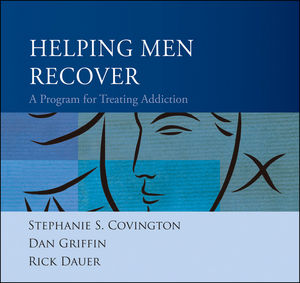|
Looseleaf
Helping Men Recover, Community Version SetISBN: 978-0-470-91434-2
Loose-leaf
300 pages
January 2011, Jossey-Bass
 |
||||||
Helping Men Recover is the first gender-responsive, trauma-informed treatment program for men. The materials, based on the widely used, evidence-based women's curriculum, Helping Women Recover, are grounded in research, theory, and clinical practice. Included in this package are a facilitator's guide and a participant's workbook.
These materials are an ideal resource for drug and alcohol counselors, mental health professionals, and program administrators for outpatient, residential, and community-based treatment centers. Helping Men Recover is presented in an eighteen-session format. The facilitator's guide offers a step-by-step manual that contains the theory, structure, and content needed to run effective groups. The participant's workbook is designed so that men can process, record, and refer back to their therapeutic experience.
The program model is organized into four modules: self, relationships, sexuality, and spirituality. These are the four areas that recovering men have identified as triggers for relapse and as necessary for growth and healing. In addition, all the materials are designed to be user-friendly and self-instructive.
Praise for Helping Men Recover
"I have been inspired by reading your curriculum Helping Men Recover. Too often men are taught not to show emotion or share feelings. The way you present the material will help men from all walks of life find their way through the recovery process, while exploring their spirituality, emotions, and relationships with strength and courage. White Bison, the Wellbriety Movement, and I fully support this program. Thanks for your work in helping other men recover."—Don Coyhis, president, White Bison, Inc.
"A superb work that fully understands and articulates the unique challenges faced by men in recovery from alcohol and drug abuse. Dr. Covington, a true pioneer in gender-responsive approaches, and her colleagues offer a powerful set of resources for this work. The model's emphases on trauma and on spirituality are especially welcome, giving this material a timely, strengths-based orientation."—Roger D. Fallot, PhD, Community Connections, Washington, DC
Stephanie S. Covington, PhD, LCSW, is a clinician, author, and organizational consultant. She is a pioneer in the design and implementation of gender-responsive treatment services for women in public, private, and institutional settings. She is the author of Helping Women Recover.
Dan Griffin, MA, has worked in a variety of areas in the mental health and addictions fields, including research, case management, public advocacy, teaching, and counseling, and in the drug court field in Minnesota and nationally for the past eight years. He is the recipient of the first Hazelden fellowship.
Rick Dauer, LADC, is the clinical director at River Ridge Treatment Center in Burnsville, Minnesota. He is a professional in the field of chemical dependence and has extensive experience in residential, outpatient, and corrections-based treatment programs.



